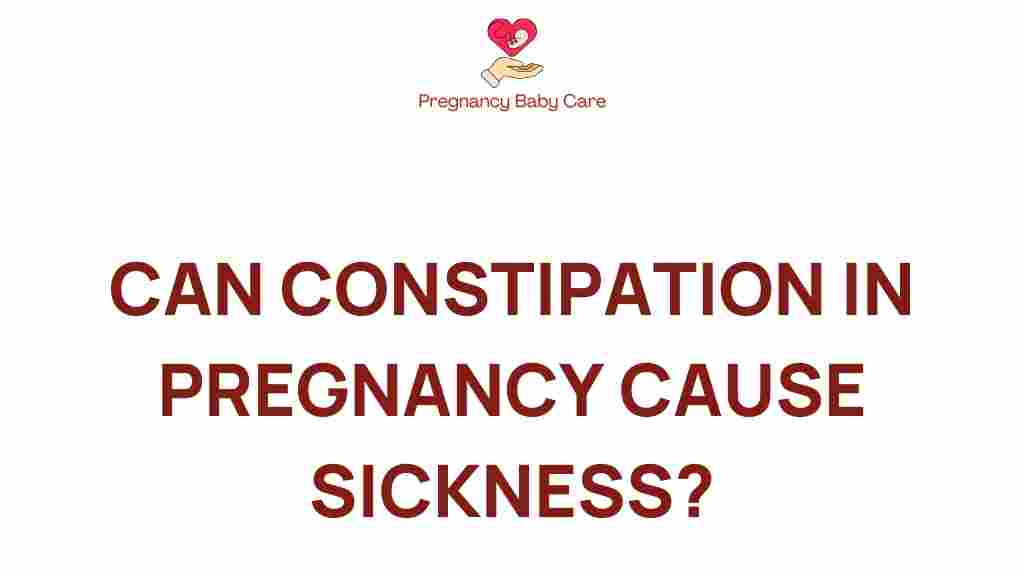Unraveling the Link: Can Constipation in Pregnancy Lead to Illness?
Pregnancy is a beautiful journey filled with excitement and anticipation, but it can also come with a range of digestive issues, one of the most common being constipation. As a pregnant woman’s body undergoes significant changes, it is essential to understand the potential health risks associated with constipation and its impact on maternal health. In this article, we will explore the relationship between constipation, pregnancy, and other related health concerns. We will also provide insights into symptoms, treatment options, and wellness tips for expecting mothers.
Understanding Constipation in Pregnancy
Constipation is defined as having fewer than three bowel movements per week, often accompanied by discomfort or straining. During pregnancy, hormonal changes, physical pressure from the growing uterus, and dietary adjustments can contribute to constipation.
Common symptoms of constipation in pregnancy include:
- Infrequent bowel movements
- Hard or lumpy stools
- Straining during bowel movements
- Abdominal discomfort or bloating
The Causes of Constipation During Pregnancy
Several factors can lead to constipation in pregnant women, including:
- Hormonal Changes: The increase in progesterone relaxes the muscles in the intestines, slowing down digestion.
- Dietary Changes: Cravings and aversions can lead to a low-fiber diet, which contributes to digestive issues.
- Physical Pressure: As the uterus expands, it can press on the intestines, making it difficult to have regular bowel movements.
- Lack of Physical Activity: Fatigue and discomfort may lead to decreased physical activity, affecting digestive health.
Health Risks Associated with Constipation in Pregnancy
While constipation may seem like a minor issue, it can lead to significant health risks for both mother and baby if left untreated. Some potential health risks include:
- Hemorrhoids: Straining can cause swollen veins in the rectal area, leading to painful hemorrhoids.
- Fecal Impaction: Severe constipation may result in fecal impaction, which requires medical intervention.
- Increased Discomfort: Abdominal pain and bloating can greatly affect a pregnant woman’s overall wellness.
- Potential Preterm Labor: In rare cases, severe constipation may contribute to complications that could trigger preterm labor.
Importance of Prenatal Care in Managing Constipation
Regular prenatal care is vital in addressing any health issues, including constipation. Healthcare providers can offer insights and recommendations tailored to individual needs. Discussing digestive issues during prenatal visits can lead to effective treatment strategies.
Step-by-Step Process to Alleviate Constipation in Pregnancy
Managing constipation during pregnancy requires a proactive approach. Here’s a step-by-step guide to alleviating this common issue:
1. Increase Fiber Intake
A high-fiber diet can significantly improve digestive health. Foods rich in fiber include:
- Fruits (e.g., apples, pears, berries)
- Vegetables (e.g., broccoli, carrots, spinach)
- Whole grains (e.g., oats, brown rice, whole wheat bread)
- Legumes (e.g., beans, lentils, chickpeas)
2. Stay Hydrated
Drinking plenty of fluids is crucial for softening stools and promoting digestion. Aim for at least 8-10 glasses of water daily. Herbal teas and clear broths can also contribute to hydration.
3. Engage in Regular Physical Activity
Gentle exercises like walking or prenatal yoga can stimulate bowel function. Always consult with a healthcare provider before starting any new exercise regimen.
4. Establish a Routine
Try to set aside time each day for bowel movements, ideally after meals when the digestive system is most active. This can help train the body for regularity.
5. Consider Probiotics
Probiotics can promote gut health and may alleviate constipation. Discuss with a healthcare provider about incorporating probiotic-rich foods or supplements into your diet.
Troubleshooting Tips for Constipation During Pregnancy
Even with the best intentions, some pregnant women may still struggle with constipation. Here are some troubleshooting tips:
- Monitor Diet: Keep a food diary to identify any dietary triggers that may worsen constipation.
- Adjust Supplements: Some prenatal vitamins may contribute to constipation. Consult a healthcare provider about alternatives.
- Relaxation Techniques: Stress can hinder digestion. Practicing relaxation techniques such as meditation or deep breathing can help.
- Seek Professional Advice: If constipation persists, it’s essential to consult with a healthcare provider for further evaluation and treatment options.
Treatment Options for Constipation
If dietary changes and lifestyle adjustments do not alleviate constipation, medical treatments may be necessary. Potential treatment options include:
- Fiber Supplements: Over-the-counter fiber supplements can help increase dietary fiber intake.
- Laxatives: Certain laxatives are safe during pregnancy, but they should only be used under medical supervision.
- Stool Softeners: These can help make bowel movements easier and more comfortable.
Always consult with a healthcare provider before starting any new treatment regimen during pregnancy.
Conclusion: Prioritizing Maternal Health and Wellness
Constipation during pregnancy is a common issue but should not be taken lightly due to its potential health risks. By understanding the symptoms, causes, and treatment options, expecting mothers can take proactive steps to improve their digestive health. Prioritizing wellness through a balanced diet, adequate hydration, and regular prenatal care can significantly enhance maternal health.
If you’re experiencing severe constipation or associated symptoms, don’t hesitate to seek guidance from your healthcare provider. For more information on prenatal care and wellness, visit this resource for valuable insights.
Remember, a healthy pregnancy is a happy pregnancy, and taking care of your digestive health is a crucial part of that journey!
This article is in the category Pregnancy and created by PregnancyBabyCare Team
